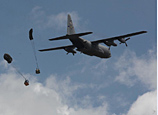
KINGSTON, June 6 (Xinhua) -- Jamaican health authorities have called on multilateral funding agencies not to suspend financial support on HIV/AIDS prevention programs.
Jamaica's health minister, Dr. Fenton Ferguson, expressed concern that efforts to combat the spread of HIV/AIDS will be affected after several multilateral agencies either indicated their intent to discontinue funding or have already done so as a result of the island nation being reclassified as an upper-middle income country.
Ferguson argued that the country's need for external support now is even more critical as it is estimated that around 30 million dollars U.S. dollars would be cost to fund the island's HIV/AIDS prevention program by 2030 and keep the HIV/AIDS prevalence level at no more than 1.7 per cent of the population.
The Caribbean has the world's second highest HIV/AIDS rates on a per capita basis and two thirds of its HIV/AIDS funding comes from international donors.
Ferguson pointed out that even though the country is designated as an upper middle-income nation, "we are in a situation where our debt to Gross Domestic Product (GDP) ratio is over 140 percent."
"We are in a situation where between debt repayments, and our compensation of staff, we are up to somewhere between 75/80 percent of the budget, and therefore what is left for all our capital projects and other things is somewhere between 20 to 25 percent," Ferguson said.
Ferguson said anti-retroviral coverage had increased since 2004, resulting in almost 43 percent of persons living longer with HIV/AIDS.
Like the rest of the Caribbean, Jamaica's HIV/AIDS program depends mainly on financial support from international donor agencies such as the United Nations Program on HIV/AIDS (UNAIDS) and the United States Agency for International Development (USAID).
However, those sources of funding are scheduled to end. For example USAID, which has provided Jamaica with 2.5 million U.S. dollars annually to fund activities targeting persons deemed at risk of HIV/AIDS, is to end its support in September 2014. A 10-million-U.S.-dollar World Bank loan facility came to an end on March 31 of this year, after an extension and a Global Fund's assistance program of 40 million U.S. dollars will end on July 31.
Ferguson contended that while the government was cognizant that it had to take ownership of its programs now that external funding is dissipating, he emphasized that there had to be a reasonable transition period.
"We are lucky that in this period, moving from 2013 to 2015, we will enjoy a transitional funding period of an additional 5 million U.S. dollars(2.5 million U.S. dollars per annum). But with all of that, we recognize that for Jamaica to survive, and the Caribbean to survive, country ownership of this program must be our target," he said.
The Jamaican government, Ferguson said, has been taking the necessary steps to boost the national HIV/AIDS program.
















 Bodyguard trainees experience 'Hell Week' in Beijing
Bodyguard trainees experience 'Hell Week' in Beijing


![]()
